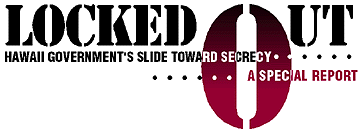

The former Circuit Court judge and Big Island mayor and other regents prompted the Legislature this year to pass, and Gov. Ben Cayetano to sign, a new law allowing two members of a board to discuss official business outside public meetings.
Regents say the old law made it difficult - especially for five new members - to brush up on tuition increases, UH-West Oahu, the law and medical schools and the $48 million in budget cuts and shortfalls at the university in the past two years.
The amendments allow private conversations between members.
Regent Ah Quon McElrath said the example Kimura gave was "certainly apropos of the kinds of fears that many of us who are new to the game had."
Since new regents who wanted background on issues were prohibited from questioning senior members in private, their only alternative was to review minutes of past meetings, a disheartening task, she said.
For example, when McElrath and Regent Momi Cazimero spoke to students on proposed increases to medical school tuition last semester, the two met separately with the students to avoid violating the Sunshine Law, which Attorney General Margery Bronster says prevented two regents from discussing official business outside official meetings.
But Beverly Ann Keever, a UH journalism professor and open-government advocate, said if two regents wanted to hold informal meetings, they just had to file a meetings notice and open the meeting to the public. It is the public, after all, that is supposed to be served, Keever said.
"They can still meet, two-on-two, but just post it," she said.
Keever said the changes to the law are a setback for openness.
Arlene Kim Ellis of the League of Women Voters worries that the law will foster private talks among City Council members. What if, she says, two members agree privately on an issue and then one of them seeks the support of another Council member, until all nine members have agreed on policy without the public's knowledge?
"So by the time it gets before the Council, they've already made their decision," Ellis said. "And where's sunshine then?"
Richard Miller, chairman of the Honolulu Community-Media Council, said the Sunshine Law "didn't prevent a lot from happening." The change will make the law more reasonable as long as the boards don't make decisions, he said.
Meanwhile, Deputy Attorney General Charlene Aina said one reason Bronster sponsored the amendments was because of confusion on what was and was not allowed on boards.
The changes allow more flexibility and definition for board members so they understand exactly what the law allows, she said.
A new law signed by Gov. Ben Cayetano allows closed meetings by: Informal meetings
Two members of a board to talk about issues involving the board.
Two or more members of a board meeting with the governor, except for contested cases.
Two or more members of a board with the director of the department to which the board is administratively attached.
Two or more members, but less than a quorum, as a subcommittee directed to investigate a matter. For example, if a board had nine members, the subcommittee could have up to four members.
Here's a summary of the state Sunshine Law as it applies to meetings of public boards and commissions: Let the sunshine in
CLOSED DISCUSSIONS
Personal information on individuals applying for professional or vocational licenses.
Hiring or firing of an employee unless the employee wants an open meeting.
Labor negotiations or the negotiation to acquire public property.
Legal issues discussed with the board's attorney, such as its powers, duties, privileges, immunities and liabilities.
Proceedings regarding criminal misconduct.
Sensitive matters related to public safety or security.
EXEMPT AGENCIES
State Legislature
Courts
Hawaii Labor Relations Board
Labor and Industrial Relations Appeals Board
Hawaii Paroling Authority
Civil Service Commission
Employees' Retirement System board of trustees
Criminal Injuries Compensation Commission
State Ethics Commission
Emergency meetings by public boards are allowed on matters board members consider an imminent peril to public health, safety or welfare or unanticipated event. To do so, the board must: EMERGENCY MEETINGS
State in writing the reasons for its findings.
Agree by a two-thirds vote of all members that the findings are correct and an emergency exists.
Post an emergency agenda as well as the findings with the lieutenant governor's office or the county clerk's office and in the board's office.
Contact those who receive the board's notice of meetings by mail or telephone as soon as practicable.